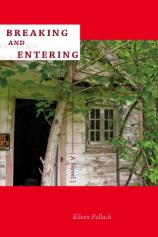Excerpt
Excerpt
Breaking and Entering

Then she drives up and sees her house. She has wanted to live in a yel- low house since she was Molly’s age. in fact, this is the exact yellow house she always wished to live in. Daffodils line the front walk, their fronds extending up and out like a diva’s arms, heads thrown back, exuber- ant, their frilly orange mouths trumpeting in song. The clapboards are a delicate shade of yellow paler than the daffs, with gingerbread along the eaves. She doesn’t have the vocabulary to describe the structures atop the roof. Gables? Turrets? Dormers? (Froufrou, Richard calls it, although he loves the house as much as she does.) It’s a beauty of a house. If not for missing Imelda and wishing Richard were better company, Louise might be content. She is lonely, that’s all. They have no neighbors except Matt Banks and his mother, who live on the farm next door, and whoever owns the shabby bungalow down the road (having grown up in such a bungalow, Louise tends to associate it with eccentrics like her parents). A few yards beyond the bungalow rises the shabby wood steeple of the Joyful Noise Church and, beyond that, runs a gravel road marked Wolverine Sports- mans Club Keep Out.
None of this would have mattered if she could have gone inside their house and found Richard playing with their daughter, wrestling with her, tickling her, the way Molly has always loved. Instead, she finds Richard lying on the couch reading Field and Stream, an odd choice, given that he has never held a gun or caught a fish.
“Where’s Molly?” she asks.
“Who? She’s in the yard.”
“She’s outside by herself?” They never let her play alone in California. Not that she ever wanted to; Molly is the kind of child who prefers to stay in view. She is older now, and there’s less traffic on Stickney Road. But it strikes Louise as odd that Richard, who until recently was so frightened for her safety that he didn’t trust himself to watch her, now allows their daughter to play outside with no one watching her at all.
“That was before,” Richard says. “After we moved here, I saw how much we’d been sheltering her. She doesn’t know how to do anything for herself.”
Louise goes to the window and is relieved to see Molly sitting on a stump read- ing a piece of paper. Still, she isn’t about to let Richard off so easily. “Aren’t you going to ask how the interview went?” Over his shoulder, she can see he is studying an ad in which two men stand in a stream up to their chests in rub- ber boots.
“Judging by your expression, I would say you blew it.”
“You’re blaming me?”
“You’re not even trying to fit in here.”
Not trying? She has just spent an entire afternoon ingratiating herself with people who believe that the only choice for a homosexual is to spend his life in the closet. She tells Richard what Janet Cohen said about the creationists. She tells him about the custodian who hosts a racist talk show.
“You think everyone in the Midwest is narrow-minded. But they could say the same about you.”
“I do not think the entire Midwest—”
“What good is it being a social worker if you’re only willing to work with people who are the same as you?”
Breaking and Entering
- Genres: Family, Fiction, Historical Fiction
- paperback: 384 pages
- Publisher: Four Way
- ISBN-10: 1935536125
- ISBN-13: 9781935536123







